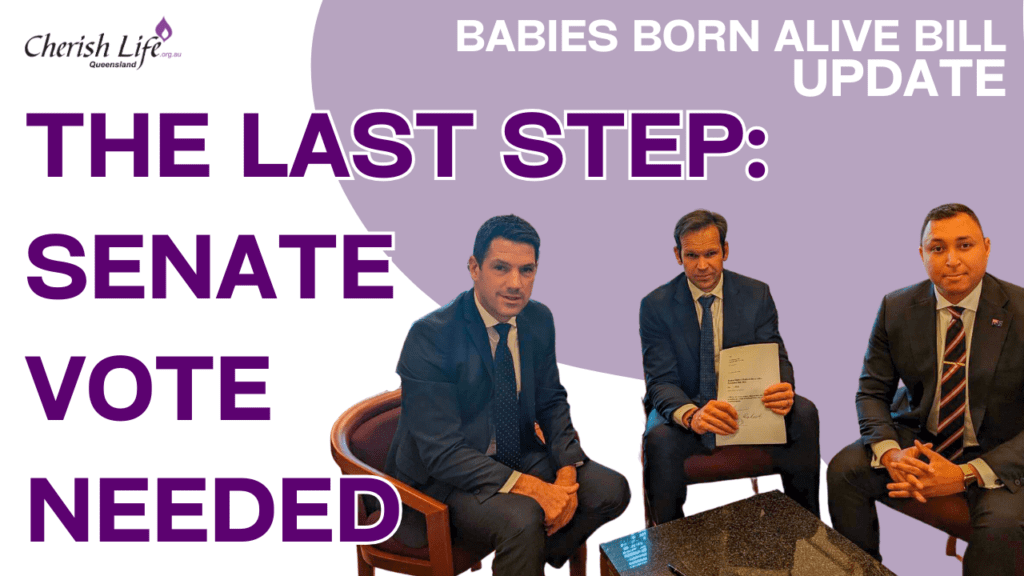
BABIES BORN ALIVE UPDATE – THE LAST STEP: SENATE VOTE NEEDED
PLEASE READ UNTIL THE END, WE NEED YOUR HELP!
1. REVISIONS TO QUEENSLAND HEALTH GUIDELINES
Queensland Health guidelines issued after the Abortion Bill passed in 2018, stated that if a live birth occurred after an abortion, healthcare practitioners were told ‘Do not provide life sustaining treatment (e.g. gastric tubes, IV lines, oxygen therapy).[i]
Quietly and without any notification, on October 6, Queensland Health revised these guidelines.
The updated guidelines specify that in the event of a baby showing signs of life following an abortion procedure, healthcare practitioners are now instructed to “provide care appropriate to the individual clinical circumstances and in accordance with best practice guidelines.”[ii]
This is significant improvement, it demonstrates Queensland Health’s acknowledgment that such a situation occurs and that their previous guidelines were flawed.
However, it is tragic to highlight that Queensland remains the only state in the country with these guidelines in place.
Furthermore, it is essential to clarify that these are still only guidelines and not a legal mandate. This once again underscores the continued importance of the Babies Born Alive Bill introduced by Senators Canavan, Antic, and Babet and highlights the continued need for your support in addressing this issue.
2. SENATE REPORT ON ‘BABIES BORN ALIVE BILL’
The Human Rights (Children Born Alive Protection) Bill was introduced into the Senate almost a year ago, in November 2022. Since then, numerous organisations and members of the public have made submissions, as well as public hearings conducted in Canberra in June. Finally, at the end of August, the Senate Report was released.
The Senate Report on the ‘Babies Born Alive Bill’ can be divided into three sections:
- Chapter 1: Introduction
- Chapter 2: Key Issues
- Dissenting Report
Chapter 1 provides details about the Bill. The following chapter, titled ‘Key Issues’ presents the perspectives of those opposing the Bill. In contrast, the Dissenting Report represents the views of Senators Canavan, Antic, and Babet.
The reason for labelling their perspectives as ‘dissenting’ is that the Committee, chaired by NSW Labor Senator Marielle Smith, chose to align with the opposing perspective. This is evident in their recommendations, which state, “Noting the diverse and strongly held views and recognizing this as a matter of conscience, the committee makes no recommendations.”[iii]
To be clear, the committee agreed that the current guidelines, which provide no protection or healthcare for babies who survive failed abortion procedures, were acceptable!
3. DEBATES OVER LEGAL GROUNDS
In Chapter 2, those opposing the Bill identified eight key issues as a result of the inquiry, while in the Dissenting Report, the Senators advocating for the Bill highlighted six key issues of their own. Nevertheless, one issue in the report underpins all the rest: the legality of the Bill.
As stated in the Explanatory Memorandum introduced in November 2022:
“The Bill engages several human rights instruments and enhances human rights by ensuring the right to life and healthcare for babies born alive. Clause 7 of the Bill outlines the constitutional basis, aiming to uphold Australia’s international obligations under articles 6 and 24 of the Convention on the Rights of the Child (CRC) and articles 24 and 26 of the International Covenant on Civil and Political Rights (ICCPR).”[iv]
However, those opposing the Bill have significant concerns about its legality. They question whether the Bill genuinely meets international human rights obligations and constitutional requirements. They argue that the Bill “seeks to override state and territory laws based on a ‘misinterpretation’ of Australia’s international human rights obligations.”[v] Dr. Tania Penovic, representing Australian Lawyers for Human Rights at the Senate Hearing, stated:
“The reason why I assert the constitutional basis of this bill is flawed is that it doesn’t have a sufficient link to the human rights it purports to uphold. Human rights mandates and treaty bodies have consistently called for the removal of barriers to reproductive healthcare on the basis that they infringe certain human rights, including those in the ICCPR, freedom from torture and cruel, inhuman and degrading treatment, rights to privacy, equality, and non-discrimination. So, this legislation, which purports to be about implementing human rights, would actually put us in breach of our human rights obligations.”[vi]
4. DISSENTING COMMENTS
Alternatively, the Dissenting Report, containing comments from Senators Canavan, Antic, and Babet, emphasises that all Australian children, whatever the circumstances surrounding their birth, deserve the same right to life and access to healthcare as any other children. This fundamental human right extends to unfortunate cases in which babies are born alive following a failed abortion procedure. The dissenting report declares that the Bill is completely in line with Australia’s commitment to Children’s Rights, stating:
“Australia has committed to every child having the right to life, every child having access to healthcare, and reducing the deaths of babies. This commitment was formalized in 1990 when we ratified the UN Convention on the Rights of the Child. Article 6 of that convention states that ‘Australia recognizes that every child has the inherent right to life.’ Australia shall ensure to the maximum extent possible the survival and development of the child. Australia shall pursue full implementation of this right and, specifically, shall take appropriate measures to diminish infant and child mortality.”[vii]
5. CRUX OF THE MATTER
Dr. Penovic’s argument centres around three main points:
- Inadequate Human Rights Connection: She claims the Bill lacks a sufficient link to the human rights it seeks to protect.
- Infringement Upon Abortion Rights: Human rights mandates and treaty bodies consistently call for the removal of barriers to reproductive healthcare due to their infringement on certain human rights.
- Infringement Upon ICCPR Rights: This includes freedom from torture, cruel, inhuman, and degrading treatment; rights to privacy, equality, and non-discrimination.
Dr. Penovic raises concerns about the Bill’s impact on human rights and abortion procedures. However, a closer examination reveals that this Bill does not in fact add any barriers to the procedure of abortion. Instead, it has two clear aims, firstly to protect babies born alive as a result of a failed abortion procedure and secondly acknowledge their own rights.
To put it simply, every death of a viable baby born alive as a result of an abortion in Australia – means that the fundamental rights of a child enshrined in the UN convention are absent in this country. Restricting the rights of a born child, whether wanted or unwanted, is a clear violation of both article 6 and 24 of the CRC.
This needs to be remedied, and lives need to be saved.
6. A CALL TO ACTION
As previously mentioned, the Senate committee unbelievably made no recommendations that the Bill be passed.
Now, a private members Bill doesn’t automatically get debated, it requires leaders of the Liberal and National parties to prioritise and give the Bill time on the Senate floor to be debated and voted on.
So we need your help. Would you please get in contact with Simon Birmingham, Liberal Party Leader in the Senate and Bridget McKenzie, National Party Leader in the Senate, urging them to prioritise this Bill and provide time for it to be discussed on the Senate floor.
Without their support the Bill will not be debated this year.
7. SAMPLE EMAIL
Below is a sample email and email addresses:
Simon Birmingham: senator_birmingham@aph.gov.au
Bridget McKenzie: senator_mckenzie@aph.gov.au
Dear Senator Birmingham/Senator McKenzie,
I am writing to implore you to prioritise the Human Rights (Children Born Alive Protection) Bill. Following a Senate Inquiry, the next crucial step is for the Senate to discuss and cast their votes on this Bill. I strongly urge you to give this Bill the attention it deserves.
Between 2010 and 2020, 324 babies were born alive in Queensland and left to die without sufficient healthcare guidelines in place. In October 2023, Queensland Health revised its guidelines to ensure that children born alive due to failed abortions receive the best medical care according to established practices. However, it’s essential to emphasise that this remains a guideline and not a legal mandate. This is a human rights issue, as every death of a viable baby born alive as a result of an abortion in Australia – means that the fundamental rights of a child enshrined in the UN convention are absent in this country.
What could be more important than this issue? Hence, why the passage of this bill in the Senate is of utmost importance.
Thank you for your attention to this critical matter.
Sincerely,
[Your Name]
[Your Addressess]
[i] This was under the section ‘5.4.3. Other fetal considerations’ which has now been removed.
[ii] ‘Guideline: Termination of Pregnancy’, Accessed 20 October, 2023. https://www.health.qld.gov.au/__data/assets/pdf_file/0029/735293/g-top.pdf
[iii] Parliament of Australia. ‘Community Affairs Legislation Committee Human Rights (Children Born Alive
Protection) Bill 2022.’ Accessed 20 October, 2023. https://parlinfo.aph.gov.au/parlInfo/download/committees/reportsen/RB000048/toc_pdf/HumanRights(ChildrenBornAliveProtection)Bill2022.pdf
[iv] Parliament of Australia. “Explanatory memorandum.” Accessed 20 October, 2023. https://parlinfo.aph.gov.au/parlInfo/download/legislation/ems/s1359_ems_dca7baf6-5e9e-4ade-8376-f0a2c4d9d202/upload_pdf/EM_22S16.pdf;fileType=application%2Fpdf
[v] Parliament of Australia. ‘Community Affairs Legislation Committee Human Rights (Children Born Alive
Protection) Bill 2022.’ Accessed 20 October, 2023. https://parlinfo.aph.gov.au/parlInfo/download/committees/reportsen/RB000048/toc_pdf/HumanRights(ChildrenBornAliveProtection)Bill2022.pdf
[vi] Ibid.
[vii] Ibid.

